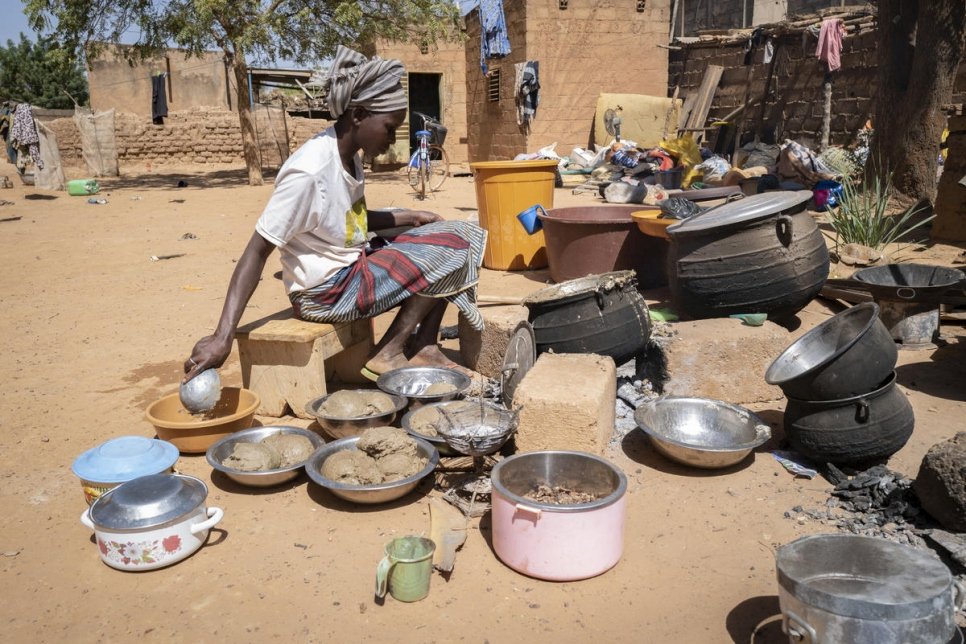In 12 months Sahel violence displaces more than 700,000 in Burkina Faso
This is a summary of what was said by UNHCR spokesperson Andrej Mahecic – to whom quoted text may be attributed – at today's press briefing at the Palais des Nations in Geneva.
UNHCR, the UN Refugee Agency, and partners are facing severe challenges in accessing and responding to the needs of the internally displaced people and refugees scattered throughout the Sahel region, as attacks against civilians grow in number and frequency.
In Burkina Faso, the latest attacks by militants on civilians and local authorities have been forcing a daily average of more than 4,000 people to flee their homes and search for safety since 1 January. So far, 765,000 people have already been displaced – more than 700,000 in the last 12 months. This is a 16-fold increase compared to January 2019. An estimated 150,000 people have fled in the last three weeks alone.
People fleeing the violence report attacks on their villages by militant groups, killing, raping, pillaging. Terrified of these attacks, residents have left everything behind to find safety.
Over 4,400 refugees from Niger have arrived in Mali, fleeing recent string of attacks in Tillaberi and Tahoua regions, including an attack in early January in the town of Chinagodar. Refugees have found safety in the Malian towns of Andéramboukane and Ménaka. They have joined another 7,700 displaced Malians in the same area. More people continue to cross the border between Niger and Mali.
In Niger, over 11,000 fled unsafe border areas and found refuge in several towns further south, where assistance is being provided. The regions of Tillaberi and Tahoua currently host 58,000 refugees from Mali and 82,000 internally displaced.
Further north, in Mali, following the latest attack against the village of Ogossagou on 14 February, where 30 inhabitants were killed, the population is scared and eager to flee to a safer place. A monitoring mission by UNHCR partners assessed their most immediate needs. Prior to the attack, people from neighbouring villages had already found shelter in Ogossagou, despite the village having been attacked in March last year and 160 of its inhabitants massacred.
Also fleeing Mali’s central region of Segou and Niono, 1,000 Malians refugees crossed into Mauritania in the past ten days, a noticeable increase from the weekly average of fifty refugees who usually originate from Northern Mali.
Everywhere in the region, survivors of attacks, those forced to flee within their country and refugees need safety, shelter, food and water. Clothing and other basic items, including dignity kits for for women and girls, are also urgently needed. Access to sanitation, to health, including psychosocial support for those who have fled or witnessed atrocities, are also priorities. The response is also aimed at host communities, as they often are the first responders despite being impoverished themselves.
Alarmed by the dramatic rise of forced displacement in the Sahel, UNHCR reiterates its call for the protection of civilian populations and those fleeing violence. Humanitarians need safe access to deliver assistance. We are already scaling up our response to the crisis, providing protection, emergency supplies for those forced to flee and communities hosting them, with an additional focus on shelter, education, sexual and gender-based violence.
For more information on this topic, please contact:
- In Dakar, Romain Desclous, [email protected], +221 786 396 385
- In Burkina Faso, Moussa Bougma, [email protected], +226 253 40 522
- In Mauritania, Viola Bruttomesso, [email protected], +222 427 82 305
- In Niger, Marlies Cardoen, [email protected], +227 80 06 81 49
- In New York, Kathryn Mahoney, [email protected], +1 347 443 7646
- In Geneva, Babar Baloch, [email protected], +41 79 513 9549

